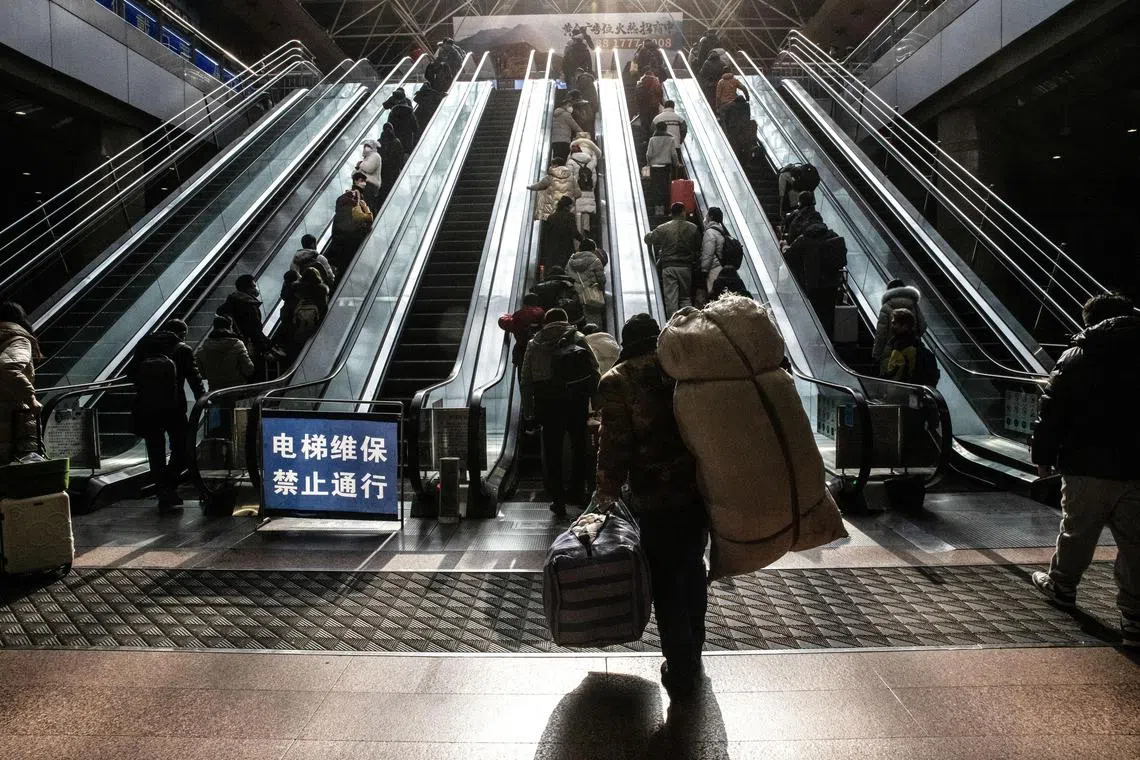China cautiously takes to the road for Chinese New Year
Sign up now: Get ST's newsletters delivered to your inbox

This year, the most important holiday on China’s calendar has a different feel.
PHOTO: NYTIMES
Follow topic:
BEIJING - Sheng Chun had not visited his parents in their mountain village in southern China for more than three years because China’s “zero-Covid” restrictions made travel difficult.
Then the country abandoned its stringent pandemic rules,
With his son and wife, Sheng, 43, embarked on a two-week journey from Beijing that would cover more than 1,600km, through cultural spots like a Ming dynasty village and temples, then finally home for Chinese New Year. He hoped to later drive his parents back to Beijing.
“I want them to go out and have more fun,” he said. “They’re in their 70s now, and for a while I was too busy working. I feel guilty that I didn’t really spend time with them.”
When the coronavirus was first detected in the Chinese city of Wuhan and began to spread widely in early 2020, local and provincial governments moved quickly to lock down tens of millions of people.
The past few Chinese New Years have been muted affairs, with many deterred from travelling by fear of the virus or by lockdowns, quarantines or other onerous rules.
This year, the most important holiday on China’s calendar has a different feel.
It comes just weeks after the government, facing economic pressure and widespread public discontent, lifted its strict Covid-19 restrictions.
For many people, the joy of finally seeing far-flung loved ones without the risk of getting caught in a lockdown is laced with anxiety – in particular, the fear of spreading the virus to older relatives in rural communities unequipped medically to handle it.
Hundreds of millions of people have been on the move, packing into train stations and bus terminals with overstuffed suitcases and bags full of gifts as they have made their way home.
That travel rush – in pre-Covid times, typically the world’s largest annual migration – used to be a source of public complaints.
But on social media, people celebrated this year’s congestion as a sign of a return to normal, or at least a new normal.
China expects traffic over the holiday to nearly double
And while the formal rules on travel have relaxed, the admonitory official language is unchanged.
At a news conference last Monday, Li Yanming, a department head at the Beijing Hospital, warned of rising cases and urged citizens to take precautions.
The Chinese Center for Disease Control and Prevention issued a notice discouraging long-distance travel for those still recovering from the latest wave of coronavirus outbreaks. In early January, China’s transportation ministry urged symptomatic travellers to avoid travel and large gatherings.
“This year, Lunar New Year travel peak coincides with the peak wave of the virus,” Xu Chengguang, the vice minister of transport, told state news media. “It’s the most challenging spring festival in recent years.”
Much of that challenge will unfold in China’s countryside, where a surge in cases partly set off by migrant workers returning to their home villages could hobble China’s sparse network of under-resourced rural heath care systems.
In mid-December, a coronavirus wave that ripped through the city of Jinzhong, in Shanxi province, overstretched its hospitals.
Long lines formed outside smaller village clinics, and medical equipment like beds and ventilators ran short.
Dr. Guo Xiaohong, a doctor at a clinic in the city, said that many had recovered since then, and that visits to her clinic had declined by half. But the new year travel rush holds with it the possibility of similar episodes elsewhere – or even again in Jinzhong.
“Experts say the population has achieved herd immunity, but how much resistance does this immunity produce against the mutation of the virus?” said Dr. Guo, who has also urged people not to travel far or even to visit relatives during Chinese New Year.
Concerns over another rural outbreak also lingered in the mind of Liu Han, a villager who had recently returned to Xiangtan, about 1,125km south of Jinzhong. His family, along with the rest of the village, caught the virus from workers at a nearby factory for betel nuts, a local Hunan delicacy.
“We’ve been closed down for so long – three years – you develop some habits, right? I’ve been locked down to the point of fear now. I’m scared of it,” he said, referring to the virus.
Mr Liu also saw the toll Covid-19 had taken on the village, which was made up mostly of older people.
Main thoroughfares were quiet, and supermarkets and pharmacy shelves had been emptied by people stocking up.
His father, a restaurant owner, had temporarily closed his restaurant because of illness among the staff. Four villagers in their 70s and 90s had died in recent weeks, Mr Liu said, adding that he did not dare to speculate on the cause.
Now, as friends and relatives arrive home for the holiday, Mr Liu remains uneasy. “It’s precisely because we’ve opened up that I feel so tense,” he said. NYTIMES

